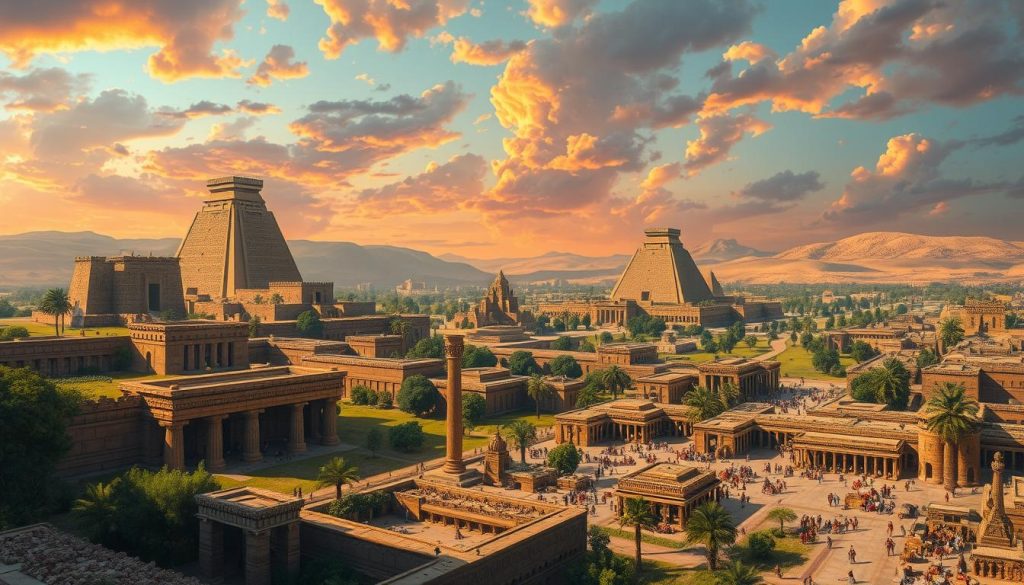The story of Jonah and the whale is a powerful tale of God’s mercy and second chances123. It shows God’s kindness and grace, and how He gives us a second chance. The book of Jonah tells two amazing stories: Jonah’s change of heart and the city of Nineveh’s transformation. Jesus also linked Jonah’s time in the whale to His own burial, showing a deep connection to Christ.
This ancient story teaches us about God’s endless love and forgiveness. Through Jonah’s journey, we see how important it is to turn back to God. It shows that no matter what, God’s mercy is always available to us.

Key Takeaways
- The story of Jonah and the whale is a captivating tale of divine mercy, repentance, and second chances.
- The book of Jonah contains two remarkable redemption stories: Jonah’s rebellion and repentance, and the transformation of the wicked city of Nineveh.
- Jesus draws a parallel between Jonah’s three days in the fish’s belly and His own time in the tomb, highlighting the symbolic parallels to Christ.
- The narrative emphasizes the boundless nature of God’s love and forgiveness, and the transformative power of repentance and second chances.
- The story reminds us that no one is beyond the reach of God’s mercy, and that true redemption often begins with a willingness to turn back to Him.
Understanding the Biblical Narrative of Jonah
The book of Jonah is a key part of the Old Testament. It talks about obedience, repentance, and God’s love for everyone4. Written between 500-400 B.C.E., it’s a story of a prophet named Jonah4.
The author of Jonah is unknown4. Yet, the book shows us God’s love is for all, not just one group.
Origins and Historical Context
Jonah came from Gath-hepher near Nazareth in Galilee5. The book was written when Jews and Gentiles were at odds in Judah4. It happened during Jeroboam II’s rule in Israel and Ashurdan III’s in Assyria5.
The Book’s Place in Scripture
The book of Jonah is special in the Old Testament5. Jesus mentioned Jonah when talking about His own death and resurrection5. This shows Jonah’s story is connected to Jesus’ mission5.
Key Themes and Messages
The story of Jonah asks big questions about repentance and forgiveness6. It shows Jonah’s fight between his own wants and God’s will5. The book teaches us to follow God’s plan5.
In the end, Jonah teaches us about God’s endless mercy and the chance for change6. It’s a message for everyone, not just one group6.
God’s Call and Jonah’s Initial Response
God wanted Jonah to preach to the city of Nineveh7. But Jonah didn’t want to help Israel’s enemies. He tried to run away by sailing to Tarshish, over 3,300 miles away7.
Jonah’s refusal to listen to God is not alone. Many others, like Abraham and Moses, also faced similar challenges7. The book of Jonah, with just 48 verses, teaches us about God’s persistence7.
The ruins of Nineveh, Jonah’s destination, are near Mosul, Iraq today7. Jonah’s fear and attempt to flee led to a journey of learning about God’s mercy.
Jonah’s story invites us to think about our own times of resistance8. We might resist God’s call due to fear or a wish for judgment. Yet, Jonah’s story shows us God’s love and purpose are always there, even when we disobey8.
The Great Storm and Sailors’ Dilemma
The ship carrying Jonah hit a great storm at sea. The pagan sailors were in a tough spot. The maritime crisis was threatening to destroy their ship and everyone on it9.
The Maritime Crisis
The crew was fighting against fierce winds and huge waves. They knew Jonah’s presence was causing the trouble9. They asked Jonah for help, hoping to find a way out of the crisis10.
The Sailors’ Faith Journey
The sailors went through a tough faith journey during this time. They saw Jonah’s God’s power and asked for guidance. They even cast lots to figure out who was to blame10.
This was the start of their spiritual journey.
Jonah’s Sacrifice
Jonah knew he was the cause of the storm. He willingly sacrificed himself to save the others. His act was a sign of the sacrifice Christ would make later9.
This moment in Jonah’s story highlights important themes. It shows divine intervention, pagan conversion, and self-sacrifice. These themes are key in the Bible and are relevant today910.
Three Days in the Great Fish
God sent a big fish to swallow Jonah, keeping him safe for three days and nights11. This amazing story from the Book of Jonah has fascinated many. It raises questions about Jonah’s survival and its deeper meaning.
The Bible says Jonah was in the fish for three days and nights, just like Jesus said in Matthew 12:4011. This makes Jonah’s story seem real, accepted by ancient Jews and early Christians11.
The book of Jonah talks about Jonah as a real person, part of the Kingdom of Israel11. This makes Jonah’s survival in the fish’s belly seem more believable. It shows God’s power at work.
It’s possible for big animals, like Jonah, to be found in whales and sharks’ stomachs1112. This makes Jonah’s story seem less impossible. It shows the natural world can be amazing.
But, who was the “great fish” – a whale, shark, or something else? The Bible doesn’t say11. This mystery has led to many different views. Some see it as a miracle, others as a sign of resurrection11.
The Story Through Different Religious Perspectives
The story of Jonah, known as Yunus in Islam, is a tale that crosses religious lines. It appears in both the Bible and the Quran, with some differences. Yet, it stands as a powerful symbol of interfaith dialogue and universal truths about turning back to God, divine mercy, and the futility of trying to escape God’s call13.
Biblical Interpretation
In the Bible, Jonah’s journey shows a deep personal battle with faith and following God. It teaches us about the power of change and God’s endless compassion, even for those seen as bad or unworthy13.
Quranic Narrative
The Quran’s version of Jonah’s story is similar to the Bible’s but also brings unique religious symbolism and views. It focuses on Jonah’s acceptance of God’s plan and the change in the people of Nineveh through true repentance14.
Modern Religious Views
Today, Jonah’s story is seen as a timeless tale of redemption and second chances. Many faiths see parallels between Jonah’s journey and our own quest for meaning, overcoming failures, and answering the divine call to help others14.
The story of Jonah is a powerful example of how interfaith dialogue and shared universal truths can unite us. By looking at this story through different faiths, we can better understand ourselves and the message of turning back, forgiveness, and God’s love1314.
Nineveh: The Wicked City
Nineveh was the capital of the Assyrian empire, known for its cruelty15. It was infamous for practices like removing prisoners’ noses and ears, and child sacrifice15. Yet, God gave Nineveh a chance for divine judgment and repentance.
When Jonah preached to the Ninevites, they all listened. From the king to the people, they fasted and humbled themselves15. Their fasting showed they were turning away from false comforts and seeking God’s mercy15.
Their repentance was real, showing they understood true change comes from God, not themselves15.
Historians call Nineveh’s revival the greatest in history, unmatched by any other16. The city’s change from wicked to seeking forgiveness shows God’s power17.

The story of Nineveh’s change is a powerful reminder of God’s second chances and mercy17. It shows how divine judgment can transform even the most ancient civilization16.
The Power of Second Chances
The story of Jonah and the whale shows God’s forgiveness and redemption. Jonah refused to follow God, but God gave him a second chance. He saved Jonah and sent him back to his task18.
Jonah’s story also shows God’s mercy to others. The city of Nineveh changed when they repented. They listened to Jonah and turned from evil, experiencing God’s forgiveness19.
God’s Mercy to Jonah
Jonah’s story teaches us that God forgives anyone. Even after Jonah disobeyed, God gave him a second chance. This shows God’s love and His wish for everyone to change and find redemption.
Nineveh’s Transformation
Nineveh changed from a wicked city to one that repented. When they listened to Jonah, they turned from evil. This change shows the power of God’s mercy and the possibility of redemption for all.
The story of Jonah and the whale teaches us about God’s forgiveness and redemption. It shows that anyone can get a second chance, like Jonah or the city of Nineveh. This story inspires us to seek divine forgiveness and the chance for societal change1819.
Jonah’s Anger and God’s Lesson
The story of Jonah takes an unexpected turn when the prophet becomes enraged after God spares the wicked city of Nineveh. Jonah’s frustration shows a stark contrast between his desire for judgment and God’s patience20. This episode highlights the common human tendency to judge others as deserving or not of mercy. The Bible teaches us that God’s forgiveness is for everyone20.
Jonah’s anger is described in vivid terms, with words like “blaze” and “burn” showing how intense his emotions were21. This reaction is seen in other biblical stories, like the parable of the Prodigal Son. There, the elder brother is upset by his father’s kindness to the wayward sibling21. Jonah’s anger shows a deep conflict between his personal wishes and God’s grace and mercy.
In a poignant dialogue, God questions Jonah’s right to be angry21. God challenges Jonah to look at his own moral growth and understanding. The story then takes an unexpected turn. God gives Jonah a plant for comfort, but then appoints a worm to destroy it21. This shows the fleeting nature of earthly comforts and prompts Jonah to face his selfishness and lack of compassion.
This part of Jonah’s story is a powerful lesson on God’s mercy and the need to forgive others, even if we think they don’t deserve it20. The story encourages readers to think about their attitudes towards others. It invites us to move from frustration to a deeper understanding of God’s patience and the power of second chances20.
Symbolic Parallels to Christ
The story of Jonah and the Whale is deeply connected to Jesus Christ. Jonah was in the fish for three days, just like Jesus said He would be in the earth for three days before rising22. This “three days prophecy” shows how Jonah’s story foreshadows Christ’s death and resurrection.
Jonah’s readiness to die for the sailors also mirrors Christ’s sacrifice for us22. This shows how Jonah’s story points to Christ’s sacrifice and redemption, key to the Christian faith.
Sacrifice and Redemption
Jonah was thrown overboard to save the sailors, just like Christ died for our sins22. These stories teach us about forgiveness, mercy, and the power of repentance.
The connections between Jonah’s story and Christ’s life highlight the Christology, messianic foreshadowing, and resurrection symbolism in Jonah’s tale22. By looking at these connections, we understand Jonah’s story’s deep meaning in Christianity.

Universal Themes of Mercy and Forgiveness
The story of Jonah delves into deep human nature, divine love, and spiritual growth. It challenges us to face our own biases and prejudices. This encourages a broader view of God’s mercy and compassion23.
It shows how we deal with pain and ask for forgiveness. This is a common experience of being wronged. It highlights the need for emotional healing and forgiveness23.
The story makes us think about forgiveness and second chances. It teaches us to turn to God for healing, not just for what others can do for us23. The idea of Kintsugi, embracing flaws and turning them into beauty, shows the beauty of forgiveness23.
The themes of mercy and forgiveness in Jonah’s story are universal. They speak to people of all cultures and beliefs. They show our deep need for compassion and the chance for change24.
Modern leaders also teach the importance of kindness and understanding. This shows that these themes are just as relevant today24.
The story of Jonah encourages us to see God’s love and mercy in a new light. It challenges us to think about forgiveness and second chances in our lives and communities25. The Bible talks about God’s mercy and forgiveness, even when we disobey, in Exodus 34:6-7 and Psalm 51:1-225.
By exploring mercy and forgiveness, Jonah’s story helps us grow. It teaches empathy and understanding. It inspires us to build a more compassionate and united community24.
It also shows the importance of accountability in our actions and decisions. This is key in solving complex moral problems24.
Modern Applications and Relevance
The story of Jonah and the whale is as relevant today as it was when it was first told. It teaches us about personal growth and the importance of listening to our inner voice. It also shows us the value of forgiveness and challenging our beliefs about who deserves mercy.
Personal Growth
The story of Jonah teaches us about obedience and change. Jonah ran from God’s call but eventually listened and preached to the people of Nineveh. His journey shows how facing our flaws can lead to growth and a sense of purpose.
Community Impact
The story of Jonah is important for building better communities. It teaches us to be kind and forgiving, even to those we might not like. This message helps us see the world in a different way and work towards a more just society.
Jonah’s story is relevant today because it inspires us to grow and make a difference. By learning from his journey, we can become more compassionate and help create a fairer world.
Conclusion
The story of Jonah and the whale is a timeless tale that makes us think about our hearts and how we treat others. It teaches us to trust in God’s endless love26. This story has been around for ages, showing us the human side and the power of changing our ways26.
It makes us ponder how our choices affect us and the world27. This ancient story is as relevant today as it was when it was first told.
Creating a good ending to this story means tying together its main ideas without just repeating them. It should also give us something to think about28. The conclusion wraps up the story’s conflicts, showing how everyone and everything has changed27.
This ending leaves us with a sense of closure and a hint of what’s to come. It makes us curious and keeps the story alive in our minds27.
The story of Jonah and the whale is a powerful reminder of God’s love and second chances26. It speaks to people from all walks of life, showing us the importance of mercy and forgiveness26. It encourages us to look at our own spiritual journeys and the chance for change that repentance offers26.
By learning from this old story, we can gain a deeper understanding of ourselves and God’s love27. It helps us see the world and our place in it in a new light.
FAQ
Q: What is the story of Jonah and the whale about?
Q: Where is the story of Jonah found in religious literature?
Q: What are the key messages of the story of Jonah?
Q: Why did Jonah initially refuse to preach to the Ninevites?
Q: What happened when Jonah was thrown overboard?
Q: How is the story of Jonah interpreted in different religious traditions?
Q: Why was Nineveh considered a wicked city?
Q: How do Jonah and Nineveh demonstrate the power of second chances?
Q: What is the significance of the parallel between Jonah and Jesus?
Q: What are the modern applications and relevance of the story of Jonah?
Source Links
- Jonah, the Fish, and Forgiveness – https://www.rclbenziger.com/jonah-fish-and-forgiveness
- repentance in the story of jonah – https://shereadstruth.com/repentance-story-jonah/
- The Story of Jonah and the whale | Pray.com – https://pray.com/articles/the-story-of-jonah-and-the-whale
- Summary of Jonah – https://enterthebible.org/courses/jonah/lessons/summary-of-jonah
- Book of Jonah Overview – Insight for Living Ministries – https://insight.org/resources/bible/the-minor-prophets/jonah
- How the Story of Jonah Works — A Writer Explains Jonah – https://howstoriesworkwithjaysherer.medium.com/how-the-story-of-jonah-works-a-writer-explains-jonah-651fc2ea1683
- Jonah 1:1-17 – Jonah’s Call Story — Susanville United Methodist Church – https://www.susanvillemethodist.org/pastorsblog/jonah-11-17-jonahs-call-story
- God’s Mission and Jonah’s Answer – Jonah 1: 1-6 – Red Village Church – https://www.redvillagechurch.com/sermons/gods-mission-and-jonahs-answer/
- 24375_01_001-294_r1ss.indd – https://courses.edx.org/c4x/HarvardX/ER22.1x/asset/Chapter-Utilitarianism__31-33_.pdf
- Acts 27: Surviving the Storm – Reflections Ministries – https://kenboa.org/biblical/acts-27-surviving-the-storm/
- How could Jonah survive three days in the belly of a “whale”? – https://christiananswers.net/q-eden/edn-t004.html
- Jonah and the Great Fish – https://answersingenesis.org/bible-characters/jonah-and-the-great-fish/?srsltid=AfmBOop0AYRja9k1FcW5sdF4p73V03WdxFQSareXrljJdiTtjXpOn0ym
- World Views, Stories & the Christian of the 21st Century – I | – https://lourdesdenver.org/world-views-stories-the-christian-of-the-21st-century-i/
- Bridging Differences and Imagining a Better Future Through Faith: Religious Perspectives on the Narratives of America – https://www.aspeninstitute.org/blog-posts/bridging-differences-and-imagining-a-better-future-through-faith-religious-perspectives-on-the-narratives-of-america/
- Nineveh – https://shereadstruth.com/nineveh/
- God Wants You in Nineveh! | Keep Believing Ministries – https://www.keepbelieving.com/sermon/god-wants-you-in-nineveh/
- Jesus and Nineveh (Jonah 3-4) – https://marcjsims.com/2015/12/18/jesus-and-nineveh-jonah-3-4/
- A Short, True Story About the Power of Second Chances – https://medium.com/hello-love/a-short-story-on-labels-and-second-chances-68e94fdc0a85
- The Power of Second Chances in Take a Chance on Me – https://dawnlynholman.com/the-power-of-second-chances-in-take-a-chance-on-me/
- Jonah’s Anger – https://shereadstruth.com/jonahs-anger-2/
- Jonah Chapter 4 Bible Study God’s focus versus man’s comfort – https://jesusplusnothing.com/series/post/Jonah4
- Old and New Testament Parallels, Symbols, and Ponderings Series Part 5 – Jacob as a Type of Christ – https://theinplacemissionary.wordpress.com/2015/01/13/old-and-new-testament-parallels-symbols-and-ponderings-series-part-5-jacob-as-a-type-of-christ/
- Forgiveness and Mercy: Weekly Summary – https://cac.org/daily-meditations/forgiveness-and-mercy-weekly-summary/
- Modern Day Version of The Parable of the Unforgiving Servant (Reflection and Questions) – https://young-catholics.com/4334/modern-parable-of-the-unforgiving-servant/
- | Wearing Jesus – https://www.wearingjesus.com/what-does-the-bible-say-on-mercy-and-forgiveness/
- How to end a short story – tips for a compelling conclusion – https://nathanieltower.com/how-to-end-a-short-story-tips-for-a-compelling-conclusion/
- What are the steps to writing an effective story conclusion? – https://www.linkedin.com/advice/0/what-steps-writing-effective-story-conclusion-skills-writing-wwnue
- Conclusions – The Writing Center • University of North Carolina at Chapel Hill – https://writingcenter.unc.edu/tips-and-tools/conclusions/